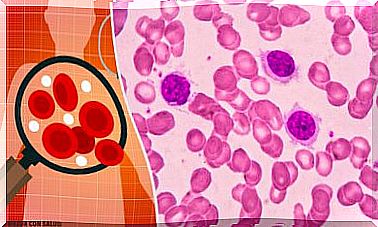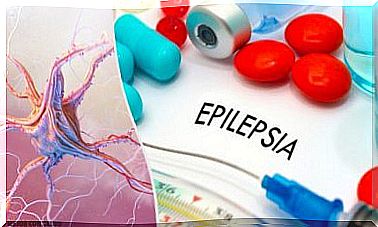Know How To Identify Toxic Thoughts
Either because of their content, the way they are raised or the consequences they have, some thoughts are better kept away from the mind in order to continue with our lives without any problem. These are the so-called toxic thoughts.
It should be noted that not only people with a clinically significant problem have toxic thoughts. They can also occur in people who do not have any psychological condition.
Toxic thoughts sometimes make everyday life difficult by attacking self-concept, self-esteem, feelings of self-efficacy, or the perception of self-worth. They are a form of self-sabotage.
Although they do not make up most of our thinking, it is important to evaluate the frequency with which they appear and if this is high, try to change this to have well-being. To help you, here are some keys to recognize them.
What is a toxic thought?

In psychology, toxic thoughts are identified as irrational thoughts. In fact, great therapeutic tools, such as cognitive restructuring or rational emotional therapy, take care of irrational thoughts as a way of working with anxiety, depression, or any disorder with cognitive elements.
The treatment of irrational or toxic thoughts is of utmost importance for progress in therapy and the achievement of goals. Many times it is these who are not only keeping the bars of our cell, but they are also the ones who have locked us in it.
Characteristics of toxic thoughts: know to identify
Toxic or irrational thoughts are characterized by a series of aspects that suppose the opposite in rational and healthy thoughts.
To know how to identify them, it is important to put that thought on the table and mark their characteristics. If most of them refer to the following, we are facing irrational thinking.
The intensity of the emotional response
Sometimes the raising of irrational thoughts leads to an overly intense emotional response. It is not that a thought reminds us of something, elicits a certain nostalgia for the holidays, or allows us to have an internal dialogue. They are thoughts that can lead to negative consequences.
Thus, as a result of toxic thoughts, we do not feel fear, but an inordinate terror; We do not feel nostalgia, but we do feel an exuberant and deep sadness; We don’t feel anger either, but we do feel uncontrolled anger. This does not mean that a thought cannot lead us to feel fear or anger, but the intensity of that response is excessive.

Toxic thoughts not based on evidence
Another characteristic of irrational thoughts is related to the truthfulness of what they say. It is okay to think something that can make us very angry or sad, as long as the content of that thought is real.
The memory of the death of a relative, the thought that something has to be done that we do not like, the recapitulation of mistakes made on stage … If these events have already happened and are palpable, we will not speak of toxic thinking.
However, some of them are not evidence-based, that is, they deal with things that have not been confirmed, that may not happen or through arbitrary inferences.
For example, a teenager may have a toxic thought of the type: “I was the cause of my parents getting divorced” and feel as a result of it a guilt that suffocates him.
As we can see, that thought is nothing more than a covariation bias, since her behavior may not be related to the divorce of her parents, and also does not have any type of evidence that she was the cause. This would be a toxic thought.
Another example can be found in a woman who thinks: “the boss seems angry, and it sure is because of the bad presentation I did yesterday.” While this may be true, and indeed the boss is not overly proud of her performance, this is toxic thinking because it is not based on evidence either.
The boss may have argued with her partner, slept badly … However, that thought that is not even confirmed is going to be causing fear in the woman even without knowing if what happens to her boss has something to do with her.
Absolutist approaches: the construction of thought
To know how to identify toxic thoughts, you also have to look at how, grammatically, they appear in your mind. Although this does not seem relevant a priori, the great difference between irrational thinking and rational thinking lies in the use of absolutes.
Thus, it is not the same to say: “I always fail all my exams”; to say: “I have failed this exam . ” In the first thought, the toxic person, who uses the adverb “always”, things that do not have to be real are taken for granted in a covert way, just by using that adverb.
The boy who has failed the exam is useless because he always fails everything, he has never passed anything. That is not true, as failing an exam or five is not the same as always failing. The use of absolutes facilitates the appearance of that intense and negative emotional response.
Other examples of absolutes in toxic thoughts are: “I never do anything right, I will always be unhappy, I will never be able to find a job.”
Personalization in irrational thoughts
Another characteristic that can help us identify toxic thoughts is the fusion between what one does and what it is. Toxic thoughts identify the results of an action, a project, a training, a day at work, a conversation … with the worth of oneself.
So if a girl loses a tennis match, she may think “I’m useless . ” She is useless for losing the match, when she has simply lost a match. It has nothing to do with your ability or worth as a person.
In another example, a parent may have an argument with their child, and think “I’m a bad parent.” This need not be the case, since an argument with a son does not prove a man’s worth as a father.

You should them in toxic thoughts
Finally, many of the toxic and irrational thoughts that we usually have are about self-demands, that is, what we think we need to be happy. This group of thoughts make up the shoulds.
For example, thoughts expressed in these terms could be: “I have to be happy when I am with my partner, I should try harder at work to be happy, I have to have everything under control, I must always be available for my children”, and so on.
Although of course there are obligations under which the should can be used (“I must finish this work by Monday because it is the delivery day”), many of them are about what we need to be happy, to achieve happiness, And many of those should be homework because we want it that way.
For this reason, it is important to differentiate between those should that really are a palpable duty, and what we impose on the road looking for happiness.
Stripping the thoughts of verbs like “have, should, have to”, can be a great little movement to stop imposing things on us that we do not know if we will be able to comply, and that we do not really have to do.
The Cartesian doubt in toxicity
Toxic thoughts are not simply thoughts that make us feel bad just for the sake of it. In fact, they have a specific morphology and characteristics that make working with them in therapy interesting and possible, as indicated by research such as that published in 2007 in the journal Cognitive Therapy and Research .
Also, these characteristics can help us to differentiate between toxic thoughts and thoughts with normal negative emotional charges, and to act accordingly.
You do not have to trust what irrational thoughts tell you, and even if they keep coming to your head, it is useful to inspect them well — especially in situations of discomfort — before believing them and acting accordingly.









